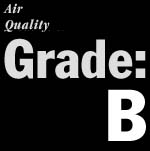 |
Home | Issues & Actions | About |
Archive Page This page is available as an archive to previous versions of LandWatch websites. |
LandWatch
State of Monterey County Report 1999
3.9
Air Quality
Monterey County is part of the North Central Coast Air Basin. The basin currently meets the federal one-hour ozone (smog) and particulate matter standards. Because the federal one-hour ozone standards were met in 1990, the basin was redesignated to a federal attainment (clean air) area in 1997.(11) While meeting federal standards, the basin continues to violate the California ozone and particulate matter standards, which are more stringent than federal standards; however, the number of violations has declined over the years. In 1987, there were 34 days exceeding the State ozone standard within the basin; in 1996, there were 21; in 1997, there were two; and in 1998 there were 12 exceedances. In 1998, there were 6 exceedances of the new federal 8-hour ozone standard. None of these exceedances occurred in Monterey County. Fifty percent of recent violations are the result of transport from the San Francisco Bay Area (i.e., the violations would have occurred even with no emission contribution from the North Central Coast Air Basin). Emission forecasts for pollutants that form ozone show a decline to about 2010, after which they begin to increase; that is, emission growth will begin to overtake emission controls. Thus, ozone levels will increase after 2020 unless additional controls are implemented. Major sources of ozone-forming emissions include mobile sources, solvents, the Moss Landing Power Plant, manufacturing, and industry. Most violations of the California standard for particulate matter of ten microns or less in diameter (PM10) have occurred at coastal stations where sea salt is the primary reason for violations. There were 9 exceedances of the State PM10 standard. Four of these exceedances were in Monterey County. Aside from violations at the coastal Moss Landing air monitoring station, there have been only two violations elsewhere in Monterey County since 1994. PM10 emissions are projected to increase over the years due to increases in vehicle travel and prescribed burns. Major sources of PM10 include vehicle travel on paved and unpaved roads, windblown dust from open fields and farming operations, and prescribed burns.(18)
|
|
CONTACT 306 Capitol Street #101 PO Box 1876 Phone (831) 759-2824 Fax (831) 759-2825 |
|
